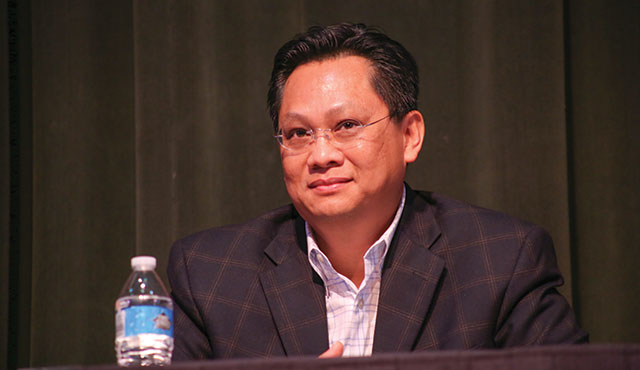It is one of the more difficult problems in Catholic healthcare – to see parishioners suffering at the end of their lives and seeking surcease from the pain. While the Church teaches that each person has love and worth until the end, sometimes that last stretch can be the most difficult to manage, for the patients, their loved ones, caretakers and the Church. At such times, physician-assisted suicide has seemed, to some, a solution.
The issue became pressing in June 2016 when the California End-of-Life Options Act went into effect, opening the way for physicians to help patients end their lives.
In Catholicism, that is not an option. Pope Francis has called the practice “false compassion,” saying, “True compassion does not marginalize anyone, nor does it humiliate and exclude – much less considers the disappearance of a person as a good thing.”
However, in these times, many have come to see it as the only way.
“The realization that so many people would consider this as an option told us we have a lot of work,” said Greg Walgenbach, director of the Office of Life, Justice and Peace for the Diocese of Orange.
The Whole Person Care Initiative, not to be confused with the state’s Whole Person Care programs, was undertaken by dioceses across California in partnership with the state’s Catholic Health Care systems to not only address the new law but also reassess how parishes deal with end-of-life issues.
It is an effort to find “a medical and pastoral approach to care through the end of life that provides a dignified, compassionate and loving alternative to physician-assisted suicide for seriously ill people and their families,” according to Church leaders.
To that end, the Diocese of Orange has emerged as a state leader in moving the initiative forward.
“Bishop (Kevin) Vann has been one of the leaders,” Walgenbach said of the movement. “He’s been a very vocal supporter.”
Bishop Vann was part of a contingent, including Dr. Ira Byock, founder and chief medical officer of Providence St. Joseph Health’s Institute for Human Caring, and Lori Dangberg of the Alliance for Catholic Health Care, that visited the Vatican in March at the Pontifical Academy of Life’s 2018 Palliative Care Congress.
“Our intent is to create a Church and Catholic health care collaborative model that serves our California parishioners and patients well, and that can be replicated by Church and Catholic health care leaders in other states,” according to a statement by California’s bishops.
In 2016, in a written response to the California law, the state’s Catholic bishops vowed “to strengthen our palliative care and other health care services for the chronically and terminally ill, so that no one we treat feels compelled to choose assisted suicide.
“Through our health care professionals and the care and compassion of all people of goodwill, we will continue to lovingly attend, accompany and care for the terminally ill on their final journey.”
“Catholic health care by its history, mission and core values is well positioned to assert clinical, social and cultural leadership in this realm of human caring,” Dr. Byock wrote in a piece in Health Progress. “Rooted in core values and an unwavering commitment to provide the best care possible for people who are seriously ill, Catholic health care also must extend to supporting the families who share in their loved ones’ illnesses, care for them and, ultimately, grieve their deaths.”
Dr. Vincent Nguyen, director of Hoag Hospital’s Palliative Care Program, said the legalization of suicide is symptomatic of a system that has lost its way.
“Where we are is a failure of the medical system,” he said, which has allowed death to be conflated with prolonged unnecessary suffering and hopelessness.
However, if patients are provided with a holistic program that addresses physical, mental and spiritual health, Nguyen says they can make better choices.
“When people know all the options, the hope is that it will not be a concern anymore,” Walgenbach said.
One of the challenges for the Church, Walgenbach says, is to do “a better job of accompaniment,” to those in end stages of life, by bringing together, educating and training the Church community and pastors to provide support.
“People want to know they are wanted, loved and worthy,” Walgenbach said.
A number of churches already do good jobs in the end-of-life arena, with health ministries and trained pastors, although it is “scattershot” Walgenbach said.
In developing the diocesan strategy, Walgenbach said parish leaders, health providers and nonprofits are all part of the discussion.
“A lot of good things are happening,” he said.
The diocese is also looking at ways to provide support to the families of the ill, with grief support and other aid.
On the medical side, Nguyen said health care systems have failed to develop standards and consistency for palliative care, which has led to uncertainty and fear. He sees the initiative as a good way for healthcare professionals to create better systems.
Over the summer, Walgenbach said the diocese is planning a series of five or six sessions on end-of-life care called Care, Prepare, Connect.
On Thursday, Oct. 25, the diocese will play host to a daylong Whole Person Care Conference at Christ Cathedral. The event will include workshops throughout the day and a keynote address by Byock, a leading palliative care physician, author and advocate for improving care through the end of life.
While the current initiative deals with the end of life experience, Walgenbach sees potential for much more.
“We’re beginning at the end of life, but the principles will really apply in any state of life,” Walgenbach said.

